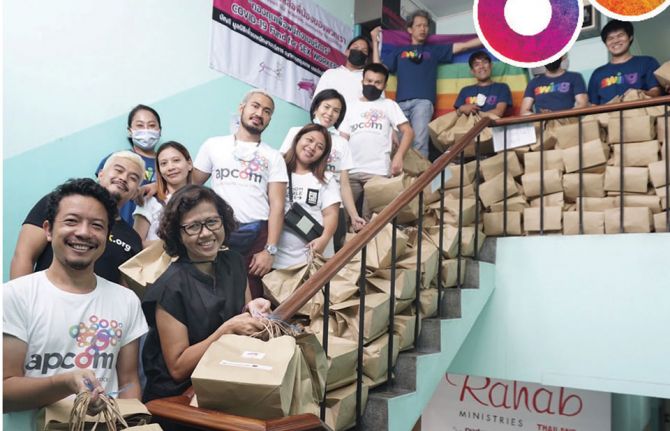

Feature Story
Reporting the realities faced by LGBTI people and people living with HIV in Asia and the Pacific
01 March 2021
01 March 2021 01 March 2021The transgender community has been severely affected by the COVID-19 pandemic in Asia and the Pacific. “My main worry is about survival and being able to support and cover the essential needs of the transgender community when job security is less and businesses are closing,” said Khartini Slamah, a transgender woman and activist from Sarawak, Malaysia, who is also known as Mama Tini in her community. “Many transgender people are unable to pay rent and utility bills, unable to do sex work, conduct their usual businesses. Some even lost their jobs,” she said.
Mama Tini’s testimony is featured in the COVID-19 Effect Series, a regular newsletter that profiles issues, challenges and solutions from the lesbian, gay, bisexual, transgender and intersex (LGBTI) communities, key populations and people living with HIV across Asia and the Pacific, created by APCOM, a regional network for LGBTI people based in Bangkok, Thailand. Since April 2020, with more than 19 issues, the newsletter has provided a platform to leverage the voices of people living with HIV and LGBTI people and to share stories, highlight challenges, showcase innovation and build strength within these communities.
The articles included in the newsletter show how civil society organizations are playing a critical role in providing essential safety nets for vulnerable communities during the pandemic. Since the first COVID-19 outbreak in Malaysia, Mama Tini has been working closely to provide support to transgender women, gay men and other men who have sex with men and female sex workers to encourage sexual health screening and testing and to raise awareness of HIV and other sexually transmitted infections.
The newsletter is also a testament to how community-led organizations have used the structure and networks from the HIV response to ensure timely access to information about COVID-19 while preventing disruption to HIV services. Examples of these initiatives include how community-led HIV services provide antiretroviral therapy, HIV testing and pre-exposure prophylaxis (PrEP) to key populations and fundraising efforts for food packages.
CARMAH, a partner in Viet Nam, has been implementing the TestSGN initiative to encourage HIV testing in Ho Chi Minh City for several years. Since the beginning of the pandemic, CARMAH has provided PrEP to 450 gay men and other men who have sex with men and transgender people in Ho Chi Minh City. During the COVID-19 outbreak, the organization implemented more flexible working schedules to ensure that PrEP and HIV testing services were not disrupted.
“The COVID-19 Effect Series documents the important work carried by our community partners and individuals in the response to COVID-19. The series captures inspiring stories from the grass-roots level on overcoming challenges, sharing best practices and how we are all working tirelessly to ensure access to HIV prevention and treatment services and the protection of LGBTI rights,” said Midnight Poonkasetwattana, the Executive Director of APCOM
The COVID-19 Effect Series also captures the unique voices of outreach workers. One of them is Deepak Tripathi, a Senior Programme Officer at the Committed Communities Development Trust (CCDT), an organization based in Mumbai, India. He has a background in and passion for documentary movies, story-telling and news anchoring, but now works full time at CCDT. Throughout the pandemic, Mr Tripathi has been committed to helping the communities hit hard by the economic fall-out from COVID-19.
“Most nongovernment organizations in India, including CCDT, play a crucial role in continuing improving the health and well-being of their target population or beneficiaries, especially during natural crises or disasters, including the COVID-19 crisis,” said Mr Tripathi. CCDT held fundraising events to support migrant workers and daily-wage communities, donated medical equipment and 3000 personal protective equipment kits to hospitals in Mumbai and supplied nutrition kits or bags to 500 individuals and the families of people living with and affected by HIV.
APCOM has also used the COVID-19 Effect Series to promote fundraising initiatives, such as #CoronaAPCOMpassion, an emergency fund started by APCOM staff donating their salaries. APCOM collaborated with SWING, the Thai Sex Workers Organization, based in Bangkok and Pattaya, and mobilized 20 000 baht (US$ 650) to purchase basic food and supplies for sex workers. Also, APCOM donated 9000 baht (US$ 300) to the Bangkok Rainbow Organization to support the health and well-being of LGBTI people in Thailand. You can watch a video here and read about other communities that have benefited from this emergency funding, and how you can support it.
“The human-interest stories included in the COVID-19 Effect Series raise the visibility of human rights violations and the challenges faced by LGBTI people and people living with HIV in accessing health services. The series amplifies community voices that have often been unheard in COVID-19 narratives,” said Eamonn Murphy, Director of the UNAIDS Regional Support Team for Asia and the Pacific, which has provided financial support to make the newsletter a reality.
To mark Zero Discrimination Day by making the voices of the communities heard, APCOM is launching a short report that compiles stories and articles published in the COVID-19 Effect Series.
Our work
Region/country
- Asia and Pacific
- Australia
- Bangladesh
- Bhutan
- Brunei Darussalam
- Cambodia
- China
- Democratic People's Republic of Korea
- Federated States of Micronesia
- Fiji
- India
- Indonesia
- Islamic Republic of Iran
- Japan
- Kiribati
- Lao People's Democratic Republic
- Malaysia
- Maldives
- Marshall Islands
- Mongolia
- Myanmar
- Nauru
- Nepal
- New Zealand
- Pakistan
- Palau
- Papua New Guinea
- Philippines
- Republic of Korea
- Singapore
- Solomon Islands
- Sri Lanka
- Thailand
- Timor-Leste
- Tonga
- Tuvalu
- Vanuatu
- Viet Nam
- Samoa



